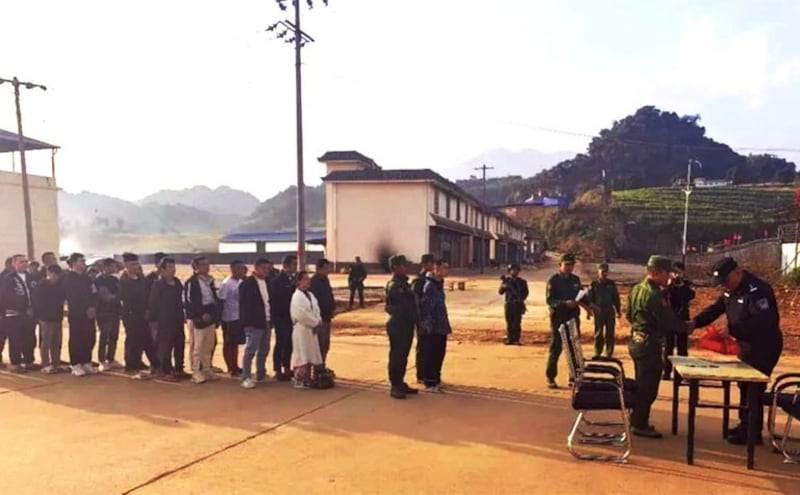Chinese fraud gangs in eastern Myanmar’s Kayin state are moving the foreign trafficking victims they use to run their operations away from a town on the Thai border to a casino in an ethnic rebel-controlled enclave amid rumors of a coming crackdown by authorities, according to casino workers.
Scam centers have plagued the border areas of Thailand, Myanmar and China as nationals from all three countries are tricked into – and subsequently enslaved in – online fraud.
The businesses typically force trafficked workers to call people across Asia and convince them to deposit money in fake or fraudulent investments.
Tens of thousands involved in the criminal schemes were deported from Myanmar in 2023 by both junta and rebel army officials. Many are linked to forced labor, human trafficking and money laundering, which proliferated after COVID-19 shut down casinos across Southeast Asia.
In January, following arrests and raids of money-laundering gangs in Shan state’s town of Laukkai along the border with China, rumors swirled of a possible crackdown by joint forces of Myanmar’s junta and Thai authorities on casinos along the Thai border.
Earlier this month, more than 800 Chinese nationals were deported from Myawaddy township's infamous gambling and scam center, Shwe Kokko, in Myanmar's Kayin state, in relation to online fraud.
Casino workers told RFA Burmese that Chinese fraud gangs are now moving the captive foreign workers who they rely on to run their operations from Shwe Koko to the Kyaukkhet Casino – known locally as the Ko Sai Casino – in a Democratic Karen Benevolent Army-controlled territory south of Myawaddy, locking them up, and demanding exorbitant ransom payments to release them.
“If you want to be released, if you want to go back home, they will threaten and demand 200,000-300,000 baht (US$5,500-8,250),” said one worker who, like others interviewed for this report, spoke to RFA Burmese on condition of anonymity due to security concerns.
“They have to work and pay it back – that's the only way,” he said.
An investigation by RFA found that up to 3,000 foreign nationals are being held at the casino, including people from Thailand, China, Vietnam, Malaysia, Cambodia, Laos, Ethiopia and Uganda.
Escapees tortured
Another casino worker told RFA that anyone who is captured while trying to escape the scamming gangs are subjected to savage beatings in front of their fellow captives.
"Last month, there were people who ran away but were caught,” he said. “It was too much for me to bear to see what they did to them. They tortured them with electric tasers and made them crawl upside down like scorpions. People even died from it.”
The casino worker said that most of the people who punished captives were “Chinese supervisors who also speak Burmese.”

Another source at the casino told RFA Lao that the 16 Lao trafficking victims in captivity urged authorities to “help us escape from the hellhole as soon as possible, because if we fail to earn money for our Chinese captors, we’ll be tortured again.”
The parent of a Lao victim held at the facility told RFA that their son had told them that he and others would be freed on March 3, but the day came and went with no news.
A representative of the Lao Embassy in Myanmar told RFA that junta officials “are working on the case” and called on anyone with information about the victims’ identities and locations to come forward.
Attempts by RFA to reach the owners of the Kyaukkhet Casino went unanswered.
No knowledge
Col. Saw Sein Win, a spokesman for the Democratic Karen Benevolent Army, or DKBA, told RFA his group was unaware of the scam gangs operating in the casino.
Saw Sein Win said that while the Kyaukkhet Casino is in DKBA-controlled territory, its owners have to “pay fees to other armed groups around here, otherwise they will be in trouble.”
He said that the previously junta-allied Border Guard Force, the military, and the ethnic Karen National Union, or KNU – the largest rebel group in the area – all have ties to the casino.
According to Saw Sein Win, the DKBA also had no knowledge that people had been trafficked to and enslaved in the casino.
“We had several cases brought to us by foreign embassies of people who were human trafficked and sold there,” he said. “In those cases, we tried to verify the names and look for and rescue them. As far as I know, we only leased the land, so we are not that deeply involved in their [casino] operations."
Saw Sein Win said the DKBA has never entered the casino or required anything of its owners, including the payment of taxes or any share of the revenue they earn. He said the casino owners are “doing their own thing with their own [security].”
“Although publicly these properties are in the DKBA area, as far as I know, [the Chinese casino owners] made deals with other groups,” he said. “If the junta's army wants money, they go there. So do the other armed groups. All of them ask for money from the Chinese owners.”
While fighting between Myanmar’s military and the KNU’s armed wing, the Karen National Liberation Army, has raged in the vicinity of Myawaddy on a near daily basis since February, residents say no clashes, airstrikes or raids have occurred in the area where the Kyaukkhet Casino is located.
Translated by Kyaw Min Htun and Phouvong. Edited by Joshua Lipes and Malcolm Foster.
